“Do not desire to fit in. Desire to oblige yourselves to lead.” – Gwendolyn Brooks
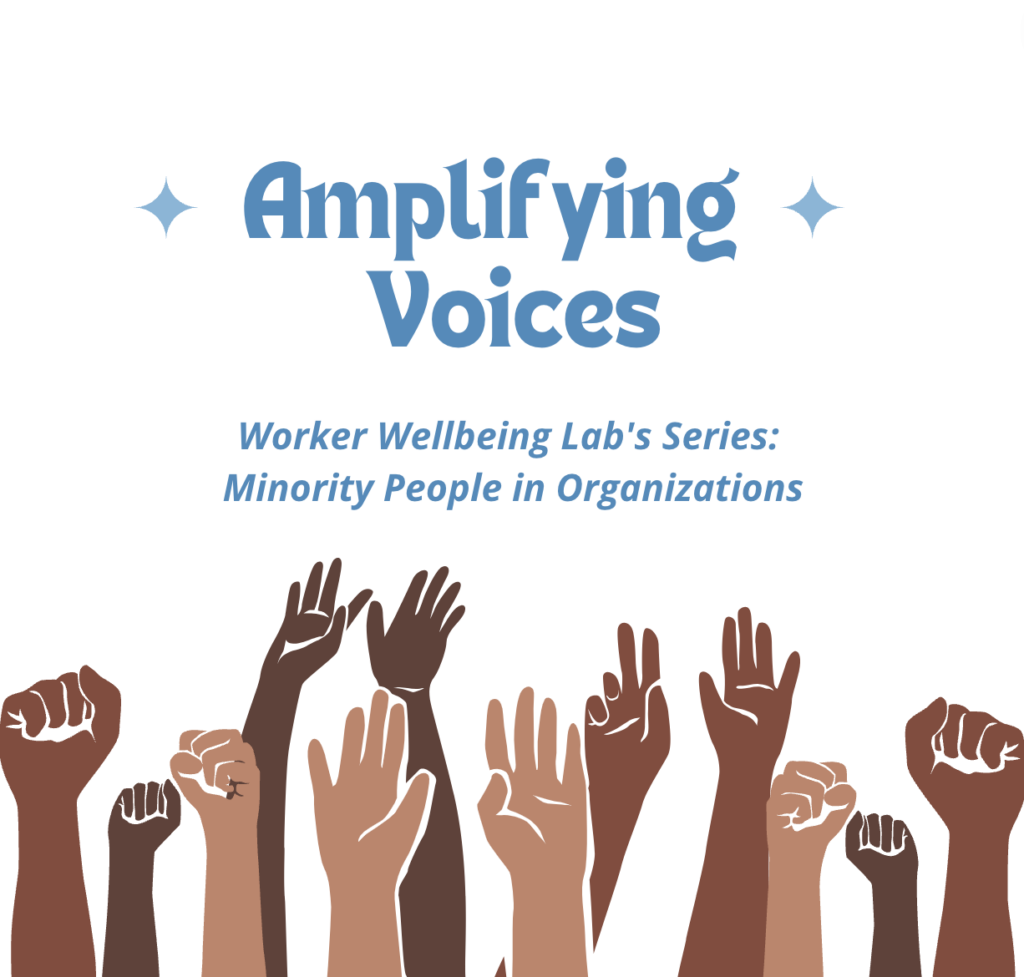
Our continuous series brings light to and discusses the transgressions, racism, sexism, and discrimination that people of color endure in the workplace, research, and academia.
Upcoming Events
Black History Month 2025
Our Afro-Diasporic panelists will recount their experiences with embracing/protecting their authentic selves in organizations and the impact of the current revocation of affirmative action and DEI practices in their lives. Please join us for an enlightening panelist discussion centered on embracing authenticity from an Afro-Diasporic perspective and a chance to learn about the community.
FEBRUARY 17, 4:00pm PT 2025 – join Here
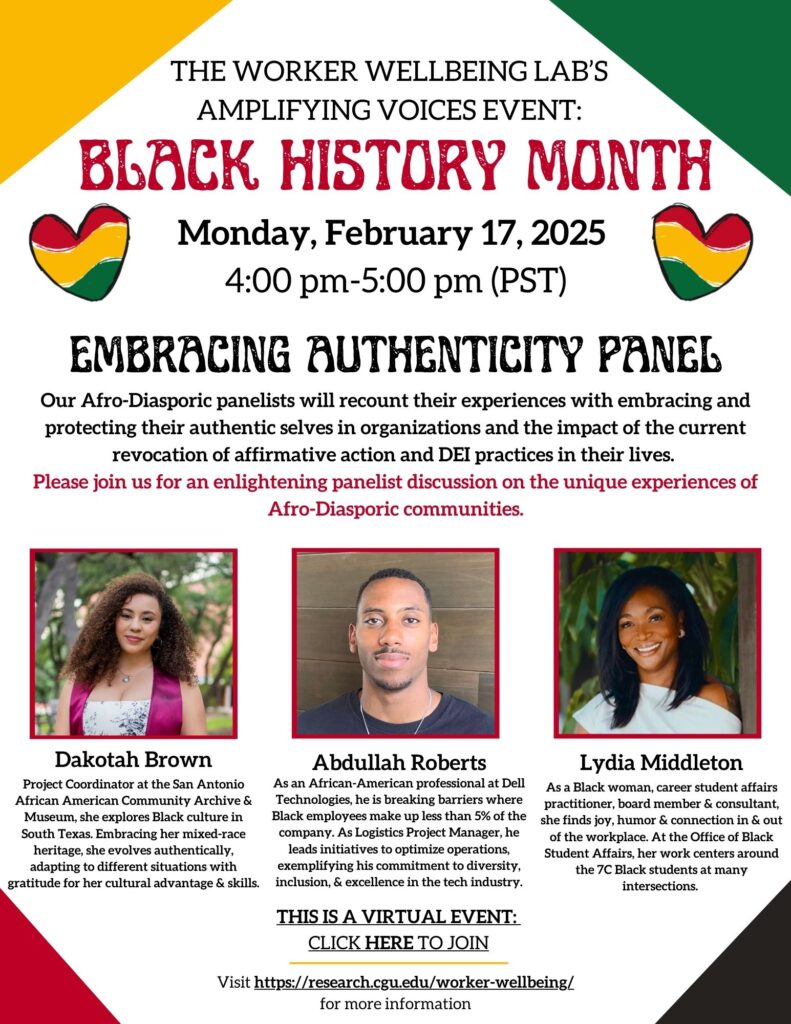
Past Events
Hispanic/Latin@x/Chican@ Heritage Month 2024
Please join us for an exciting panel discussion centered on embracing authenticity from a Hispanic, Latin@/x, and Chican@ perspective and a chance to learn about the community!
OCTOBER 2, 4:00pm PT 2024
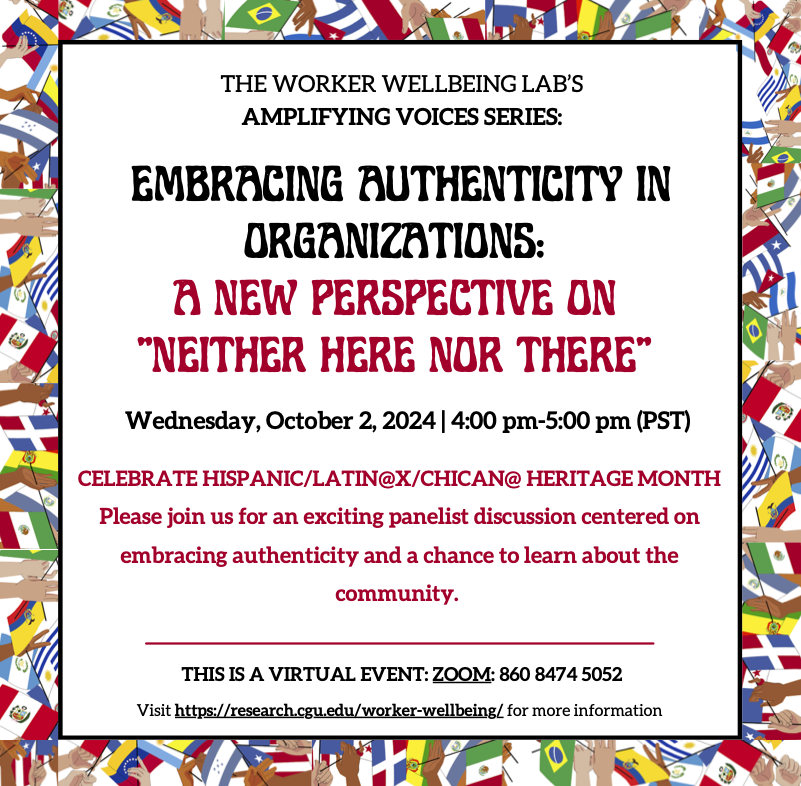
2024 International Women’s Day

Feminist Comedy Sketches
Join us for our annual feminist comedy sketches viewing party!
Women in STEM Panel with Paola Rosenberg, Dr. Katherine Van Heuvelen, Dr. Michelle Edwards, & Dr. Yan Li
Black History Month: Navigating Academia as Afro-Diasporic
Join us this Black History Month as we delve into the arduous and inspiring journeys that scholars and academics of the Afro-Diaspora uniquely experience
february 12, 4:00pm PT 2024
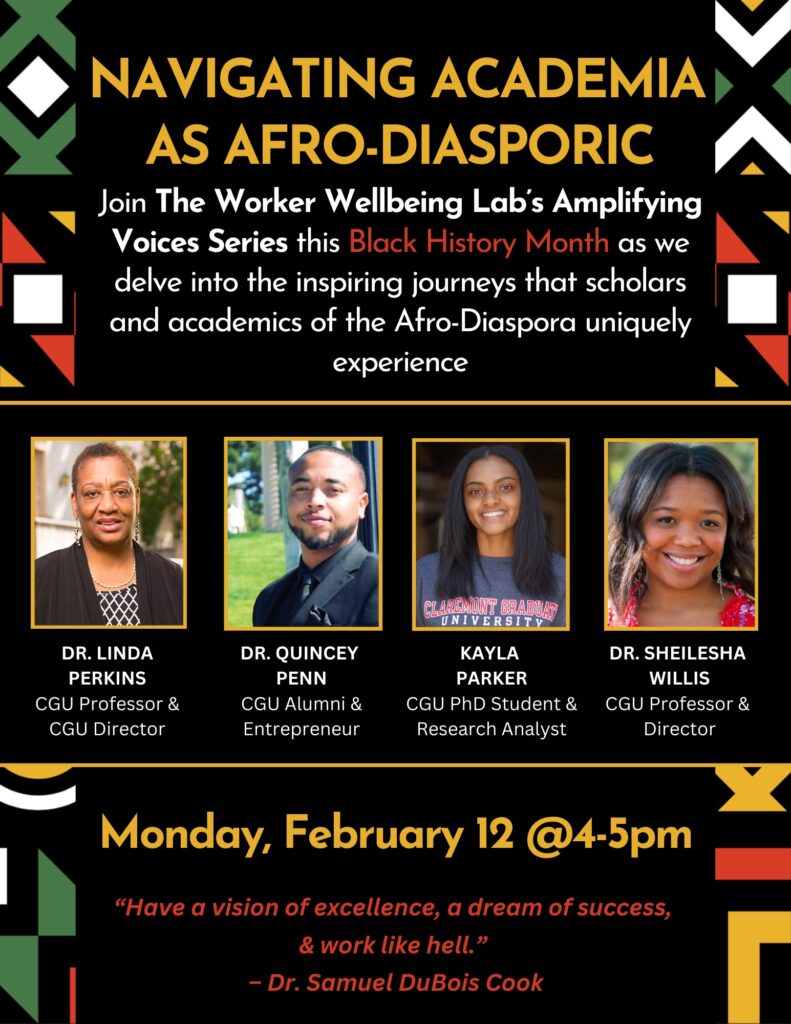
Presented by Dr. Javier M. Rodríguez: The Politics-Health Disparities Connection as a Fundamental Cause for Lack of Diversity, Equity, and Inclusion – November 6th, 2023, 4:00pm PT – 5:00pm PT
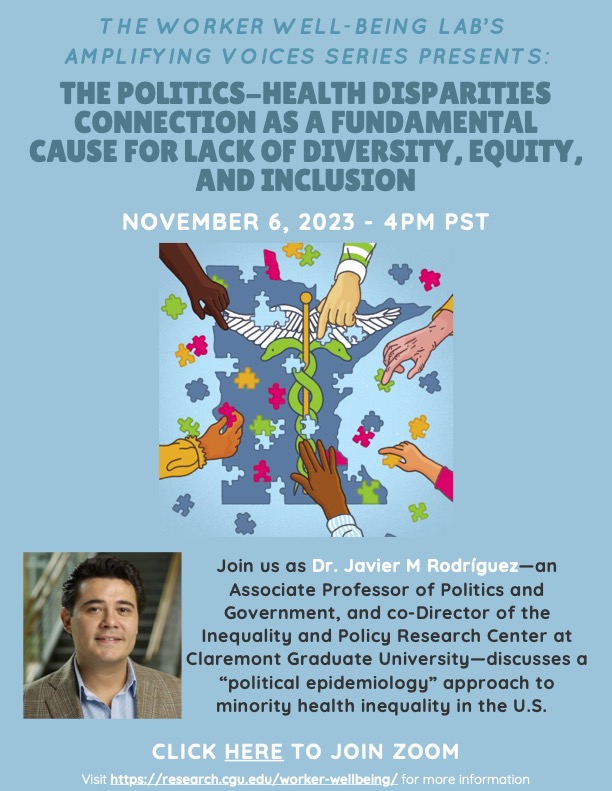
Event Description:
Join us as Dr. Javier M Rodríguez—an Associate Professor of Politics and Government, and co-Director of the Inequality and Policy Research Center at Claremont Graduate University—discusses a “political epidemiology” approach to minority health inequality in the U.S.
Hispanic/Latinx Heritage Month: Diversity Climate – October 2, 2023, 4:00pm PT – 5:00pm PT
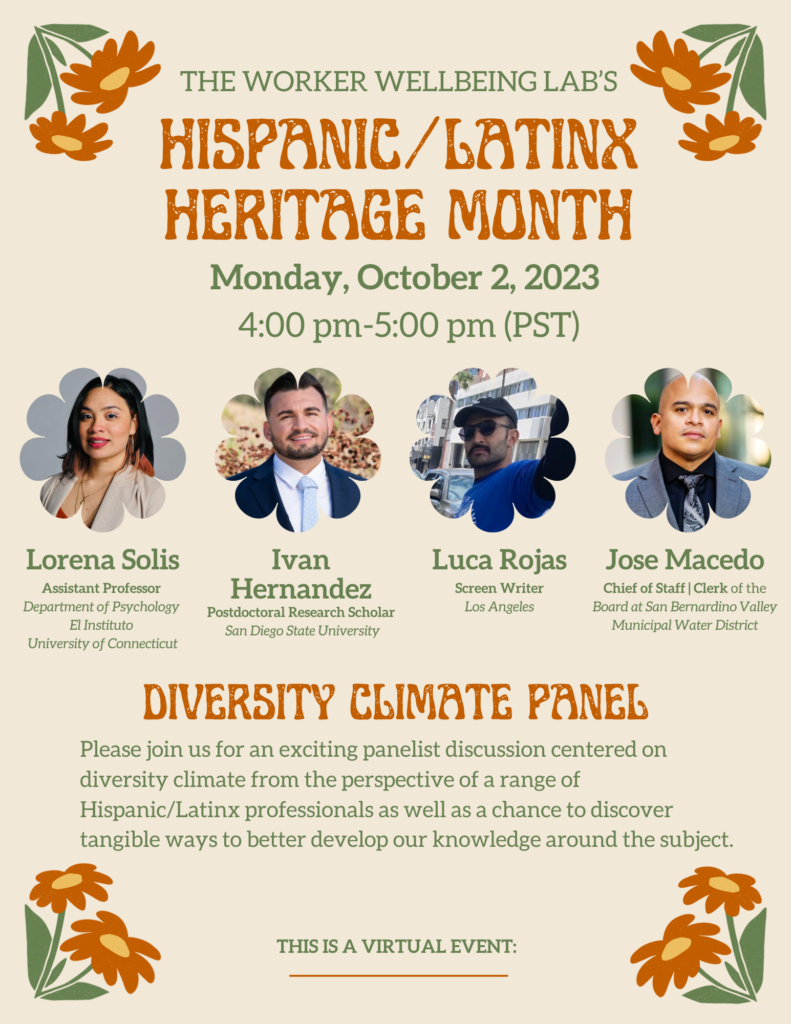
Event Description:
Diversity Climate – The degree to which an organization, its leaders, and people are perceived to demonstrate that they value diversity and historically marginalized employees by including them socially, treating them fairly, and not discriminating against them.
Please join us for an exciting panelist discussion centered on diversity climate from the perspective of a range of Hispanic/Latinx professionals. By amplifying the voices of these professionals, we hope to gain a deeper understanding of what a healthy diversity climate could look like for the Hispanic/Latinx community and tangible ways to better develop our knowledge around the subject.
Want to dig deeper? Supplemental articles will be provided!
ZOOM LINK HERE
Black History Month: Black Racial Inequality in Psychological Research & Academia – February 21, 2023, 4:00pm PT – 5:00pm PT

Event Description:
“I feel that if we don’t take seriously the ways in which racism is embedded in structures of institutions, if we assume that there must be an identifiable racist who is the perpetrator, then we won’t ever succeed in eradicating racism.” ― Angela Y. Davis, Freedom is a Constant Struggle
In February’s lab, we will be discussing three focal articles that highlight the racial history and current nature of psychological research and academia, which systematically has and continues to exclude, ignore, and oppress people of color in multiple ways. We will discuss together ways in which we can push for and mitigate equity and equality in research and academia.
Bring your favorite article(s) to add to our public Black History Month literature folder!!
ZOOM LINK HERE
This article articulates that systemic inequality exists within psychological research and that systemic changes are needed to ensure that psychological research benefits from diversity in editing, writing, and participation:
Roberts, S. O., Bareket-Shavit, C., Dollins, F. A., Goldie, P. D., & Mortenson, E. (2020). Racial inequality in psychological research: Trends of the past and recommendations for the future. Perspectives on psychological science, 15(6), 1295-1309.
This article discusses presents examples of how epistemic oppression exists within psychological science, including in how science is conducted, reported, reviewed, and disseminated:
Buchanan, N. T., Perez, M., Prinstein, M. J., & Thurston, I. B. (2021). Upending racism in psychological science: Strategies to change how science is conducted, reported, reviewed, and disseminated. American Psychologist, 76(7), 1097.
This article draws from Black Feminist Theory to address some of the ways in which anti‐blackness and liberal White supremacy are manifested in the lives of Black faculty and students, and propose that non‐Black allies have key roles to play in resisting them:
Bell, M. P., Berry, D., Leopold, J., & Nkomo, S. (2021). Making Black Lives Matter in academia: A Black feminist call for collective action against anti‐blackness in the academy. Gender, Work & Organization, 28, 39-57.
Celebrando Hispanic Heritage Month – September 29, 4:00pm PT – 5:00pm PT
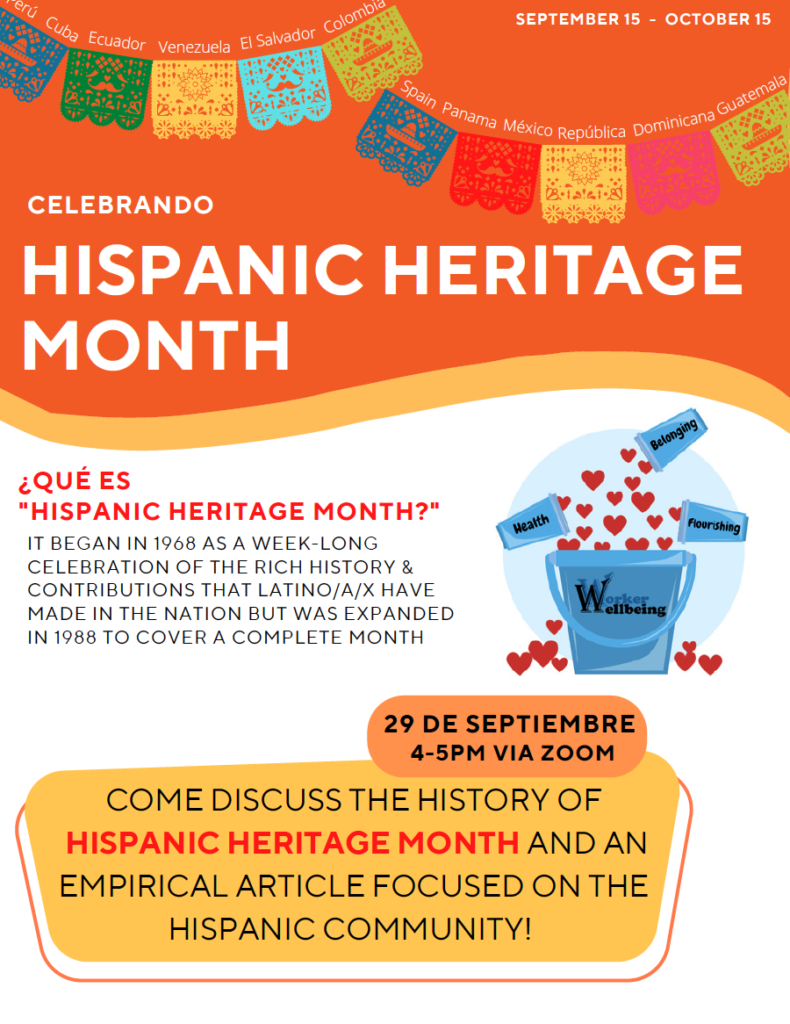
Event Description:
To celebrate Hispanic Heritage Month (September 15- October 15), we are hosting an open-lab event to discuss the history of Hispanic Heritage Month and a recent empirical article by Marin et al. (2021) focused on the Hispanic community.
ZOOM LINK HERE
Empirical Article: Marín, L. S., Barreto, M., Montano, M., Sugerman-Brozan, J., Goldstein-Gelb, M., & Punnett, L. (2021). Workplace sexual harassment and vulnerabilities among low-wage hispanic women. Occupational Health Science, 5(3), 391-414.
https://link.springer.com/article/10.1007/s41542-021-00093-6
Click Here for the series slides
Racial Microaggressions in the Workplace – May 5, 4:00pm PT – 5:00pm PT
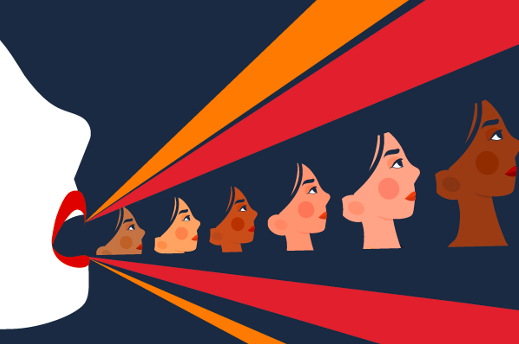
Event Description:
Microaggressions are anything but micro — they are defined as “brief and commonplace daily verbal, behavioral, and environmental indignities, whether intentional or unintentional, that communicate hostile, derogatory, or negative slights and insults to marginalized individuals and groups.” Racial microaggressions are constant stings and barbs. They negatively impact job satisfaction, self-esteem, and physical/mental health issues of minority employees.
In May 5th’s lab, we will be discussing two focal articles about the occurrence and impact of microaggressions on minority women in the workplace.
This article demonstrates how “not seeing color” prevents one from acknowledging subtle racial workplace discrimination:
Offermann, L. R., Basford, T. E., Graebner, R., Jaffer, S., De Graaf, S. B., & Kaminsky, S. E. (2014). See no evil: Color blindness and perceptions of subtle racial discrimination in the workplace. Cultural Diversity and Ethnic Minority Psychology, 20(4), 499. https://doi.org/10.1037/a0037237
This article discusses the consequences of the “model minority” perception on recognizing racial microaggressions toward Asian Americans:
Kim, J. Y., Block, C. J., & Yu, H. (2021). Debunking the ‘model minority’ myth: How positive attitudes toward Asian Americans influence perceptions of racial microaggressions. Journal of Vocational Behavior, 131, 103648. https://doi.org/10.1016/j.jvb.2021.103648
Amplifying Black Women in the Workplace – February 24, 4:00pm PT – 5:00pm PT

Event Description:
Did you know that over 30% of employed Black women work in the management, business, professional and related workforce? The women of the Worker Wellbeing lab will be highlighting these professionals in organizations. Join us to discuss literature, research, and personal experiences surrounding Black women in the workplace.
In February 24th’s lab, we will be discussing two focal articles featuring Ashleigh Shelby Rosette. Dr. Rosette’s research focuses on the intersection of leadership, gender, and race. She is one of the most decorated teachers in the history of Duke University’s Fuqua School of Business and is currently the Senior Associate Dean of Executive Programs at Duke. Please join us to discuss her work! In preparation, we recommend reading the following articles. Both publications are available via the Claremont Library system.
This article investigates how agentic biases may hinder women’s progression to leadership positions:
Rosette, A. S., Koval, C. Z., Ma, A., & Livingston, R. (2016). Race matters for women leaders: intersectional effects on agentic deficiencies and penalties. The Leadership Quarterly, 27(3), 429–445. https://doi.org/10.1016/j.leaqua.2016.01.008
This article spans four experiments looking at whether race is a component of the typical leader prototype:
Rosette, A. S., Leonardelli, G. J., & Phillips, K. W. (2008). The white standard: racial bias in leader categorization. The Journal of Applied Psychology, 93(4), 758–77. https://doi.org/10.1037/0021-9010.93.4.758